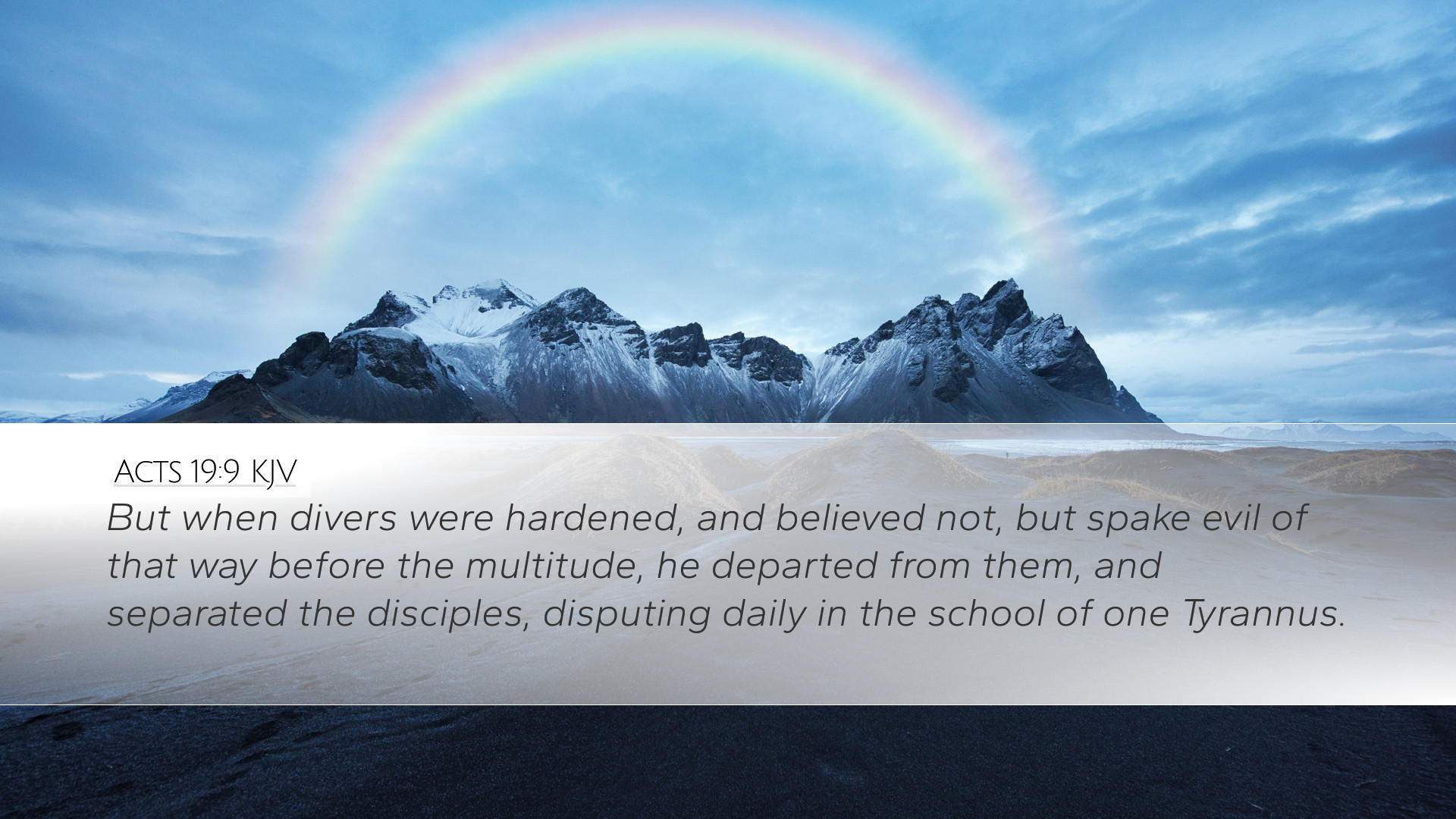Acts 19:9 - Bible Commentary
Verse: Acts 19:9 (KJV) - "But when divers were hardened, and believed not, but spake evil of that way before the multitude, he departed from them, and separated the disciples, disputing daily in the school of one Tyrannus."
Introduction
The narrative surrounding Acts 19:9 highlights a significant moment in the ministry of the Apostle Paul. As he faced opposition in Ephesus, this verse encapsulates the struggle between the message of the Gospel and the hardened hearts of some audiences. It reveals essential themes of resistance, separation, and the perseverance of witness amidst adversity. Various commentaries provide deeper insights into this passage.
Contextual Overview
This verse is situated within Paul's third missionary journey, specifically during his time in Ephesus, a city renowned for its pagan practices and idolatry. Paul’s evangelistic efforts lead to both conversion and conflict, highlighting the polarized responses to the Gospel. The ensuing events prompt a separation from those who resist the truth, emphasizing the importance of sowing the seeds of the Gospel in fertile ground.
Hardened Hearts
Commentators like Matthew Henry note that the phrase “divers were hardened” illustrates the spiritual state of those who reject the Gospel. Their refusal to believe is indicative of a willful choice rather than mere ignorance:
- Willful Rejection: Henry emphasizes that the hardness of heart signifies a deliberate choice against the truth.
- Resistance to God’s Word: Albert Barnes reiterates that the resistance displayed paints a picture of unequivocal rebellion against divine truth.
Spake Evil of That Way
The phrase "spake evil of that way" reflects the antagonism faced by early Christians. Adam Clarke suggests that such an expression indicates not only verbal dissent but a broader societal rejection of the Christian faith:
- Social Implications: This antagonism represents the societal challenges that early Christians confronted and serves as a reminder of the stigma that can accompany faith.
- Spiritual Warfare: Clarke also denotes this tension as part of spiritual warfare, where the truth of the Gospel is met with fierce opposition.
Paul's Response
In light of the opposition, Paul exemplifies a critical pastoral response: he departs and separates the disciples. This act speaks volumes about leadership and the necessity of safeguarding those who are receptive to the Gospel:
- Separation from Unbelief: This separation fosters a sacred space for teaching and discipleship, as indicated by Henry’s reflections on the importance of nurturing the faithful in a conducive environment.
- Disputation in the School: Paul’s choice to engage daily in the school of Tyrannus underscores the necessity of persistent teaching and equipping believers.
Disputing Daily
Paul’s commitment to “disputing daily” indicates an intentional strategy to deepen the understanding of the disciples within a structured environment. This underscores the importance of continual learning and dialogue in the Christian faith:
- Importance of Education: Barnes highlights the pivotal role of teaching in establishing robust faith, drawing attention to the value placed on education and capacity building.
- Engagement with Culture: By engaging in the school, Paul illustrates how believers must be intellectually equipped to confront the dominant ideologies of their time.
The Implications for Believers
This passage serves as a reflective point for modern believers, reminding them to be vigilant against spiritual hardness while emphasizing the importance of community and education in the faith:
- Holy Resistance: The need to be discerning about influences on one's faith and the company kept is vital in nurturing a faithful community.
- Continuous Learning: The call to engage in learning and discipleship should resonate with church leaders and scholars, reminding them to create environments conducive to spiritual growth.
Conclusion
Acts 19:9 is a powerful testament to the challenges and triumphs of evangelistic endeavors. Through the lens of the commentaries by Matthew Henry, Albert Barnes, and Adam Clarke, we glean insight into the implications of hardened hearts, the importance of faithful separation, and the necessity of persistent teaching. As we contemplate this passage, may we be encouraged to remain steadfast in our witness, properly nurture our communities, and engage thoughtfully with a world that often resists truth.


